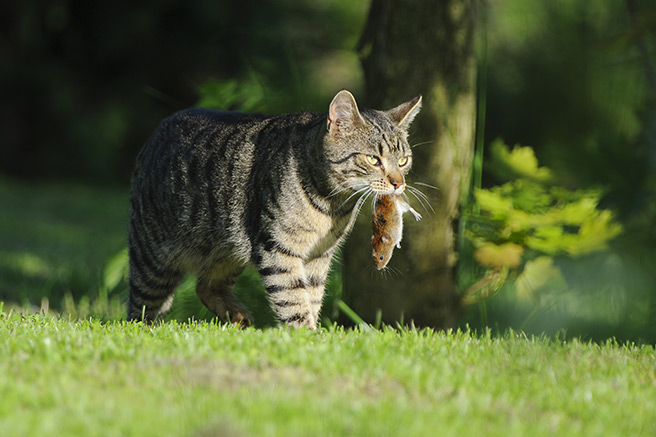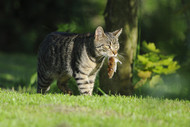Why do Cats Eat Grass?
26th Jul 2023

Researchers believe that eating grass
offers some important health benefits.
As we all know cats are obligate carnivores, which means they need to eat meat to satisfy their nutritional needs. However, even wild cats naturally ingest some grass when they eat their prey. Both wild cats, such as bobcats, lions, and tigers, as well as domestic cats like to snack on grass. Although some experts believe a domestic cat can live a long and healthy life without ever nibbling on the lawn, they also believe there is absolutely no harm in a cat doing so, and there may well be some advantages.
Benefits of Grass for the Gut
Cats will eat grass and more often than not, this will lead to vomiting. Cats can’t digest grass and if ingested, it will normally still be fully formed, when expelled through the faeces. Vomiting obviously isn’t anything pleasurably for a cat to do. It can be distressing to watch a cat trying to cough up a hairball, yet the cat appears visibly relieved when it’s over and this is an important part of a cat’s existence. Vomiting helps rid their digestive tract of all sorts of unwanted bits, such as fur, parasites, feathers and bones, that could ultimately harm them if they weren’t ejected from their bodies. Therefore, even in an indoor cat, giving it a small amount of grass to eat, can be a natural hairball remedy. In an outdoor cat that hunts, eating grass may even help prevent more serious medical issues.
The grass is not just useful to prevent hairballs by making a cat vomit. It can also act as a natural emetic, by helping to clean out the lower digestive tract. In this situation too, this action helps clear unwanted parasites and undigested hair, thereby also preventing constipation.

An Instinctive Action
So, even indoor cats, that are well kept, well-groomed and parasite-free, may still enjoy nibbling on grass and leafy greens, despite this remaining undigested when expelled in the vomit or the faeces. A cat will generally eat grass because it’s instinctive, possibly because it knows that by doing so, this assists with the issues discussed above. Veterinarian Benjamin Hart at the University of California-Davis has studied green-eating in omnivorous chimpanzees and carnivorous felines. He believes eating plants may have conferred a survival advantage in house cat ancestors, helping them expel parasites and absorb trace nutrients. Domesticated cats still retain many wild behaviours including their hunted skills.
Cat-Friendly Nutrients in Grass
Overall, we can see that although cats can’t digest grass, by eating it, there are advantages with ingesting it. This also includes the knowledge that the grass releases some vitamins and minerals found in plant cells. It is known that grass juice contains folic acid. This is important for cats, as it is essential for the nervous system development in kittens and also red blood cell production in adult cats.
In addition, grass consists mainly of water. Most cats get their daily water requirement from their food. Therefore, nibbling on wet, dewy grass, may help maintain a cat’s hydration levels, particularly in cats that are only fed on dry food, whose bodies may be slightly dehydrated.
In summary, we can see that this habit of grass eating in cats, is a normal and relatively important action to assist with certain issues that cats suffer from. Although there is no substitute for a natural, high protein, carnivorous diet, the grass eating can provide other essential assistance with certain conditions.

